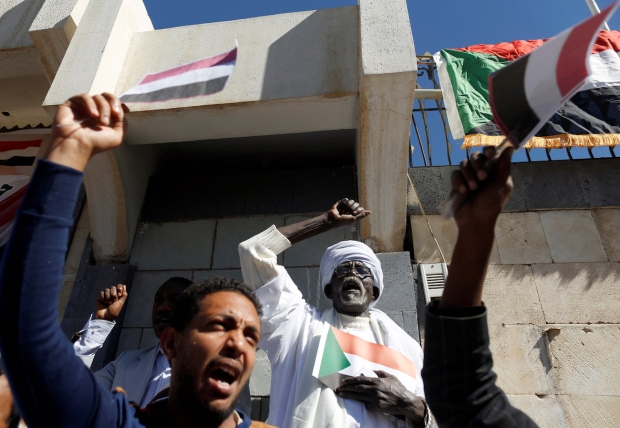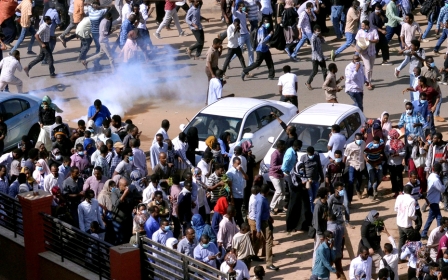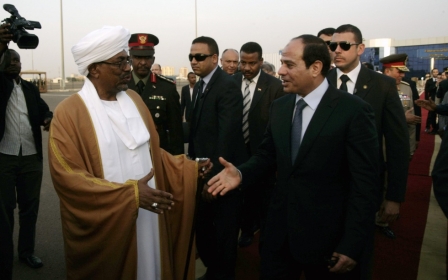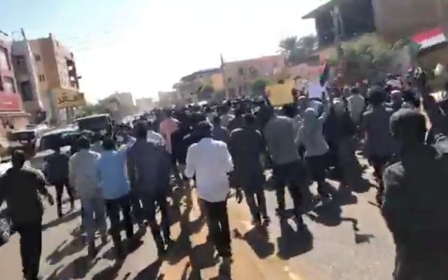Sudan protests spread to Darfur as Bashir vows rallies won't force him out
KHARTOUM, Sudan - Calling for peace, freedom, and justice, residents living in Sudan's Darfur region took to the streets for the first time since anti-government protests broke out in the country, adding their voices to ongoing opposition to the rule of President Omar al-Bashir.
Thousands of Darfur residents, including those living in internal displacement camps, called on Monday for Bashir's removal and for an end to the ongoing discrimination many in the region say they face.
Holding up banners reading, "Racist regime" and "Racist system must go now", the protesters also called for an end to the fighting that has displaced thousands across Darfur.
Pro-government militias were quickly mobilised to stop the demonstrations, however.
Mohamed Badawi, a Sudanese political analyst, said the presence of these militias, such as the Rapid Support Forces (RSF), is one of the main reasons people in Darfur are hesitant to take to the streets.
“The people of Darfur have had bad experiences with protesting or making any public opposition to the government, as Darfur is now run by the army intelligence units and RSF,” Badawi told Middle East Eye.
“The mobilisation of government militias brings back bad memories of the mass killings that happened during the September 2013 protests," he said, referring to a wave of rallies that were organised against a government decision to end fuel and other subsidies at the time.
Dozens of people were killed after security forces fired tear gas, rubber bullets and live ammunition to stem those protests, and many others were injured and arrested, Human Rights Watch reported in 2013.
“Even now there is violence, including killings and regular abductions against activists and journalists, but this gets no coverage as there is a complete media blackout in the region," Badawi said.
Protests in several parts of Darfur
Another Sudanese political analyst, Majid Mohamed Ali, said the government’s use of emergency laws, which have been imposed on the five states of Darfur, is one of the main reasons why people in the region took so long to join the nationwide protests.
The current wave of unrest began on 19 December in response to an increase in bread prices, but rapidly grew into a wider call for Sudan's longstanding president to step down after almost three decades in power.
“The fragile security situation and unusual politics, coupled with the emergency laws, has meant the political dynamics and demands [in Darfur] are completely different to the whole country,” Ali said.
The people of Darfur have had bad experiences with protesting or making any public opposition to the government
- Mohamed Badawi, Sudanese political analyst
However, despite the deployment of RSF forces, the first anti-government rallies went ahead in several parts of Darfur over the weekend, including in Nyala, El-Fashir and Genena.
Hundreds of people rallied for the first time in Nyala, the main city of South Darfur, and in El-Fashir, in North Darfur, on Sunday, as police and other security officials fired tear gas and live ammunition to disperse the crowds.
The protests continued and were especially loud in Nyala on Monday, coming just hours after Bashir visited the city.
Bashir's last visit to Darfur ended in bloodshed, after Sudanese troops clashed with IDPs in South Darfur in September, killing three and injuring more than 20 others.
On Monday, the Sudanese president remained defiant as he addressed a rally of thousands of his supporters, vowing to resist the protesters' demand for him to resign and once again blaming the ongoing unrest on unnamed Western countries.
"The government does not change through demonstrations," Bashir told the crowd.
"The only way to come to power in this country is through the ballot box and we promise to guarantee free and fair elections," he said in his speech, which was broadcast on state television.
"We said we have an economic problem and it is not solved via vandalism," he added.
Protesters arrested amid security crackdown
Internally displaced persons (IDPs) in Kalma camp, less than 20 kilometres from Nyala, rejected Bashir's comments, however, calling on the president to be arrested and tried before the International Criminal Court.
The ICC issued arrest warrants for Bashir in 2009 and 2010 on charges of crimes against humanity, war crimes and genocide, in relation to actions allegedly committed in Darfur between 2003 and 2008.
On Monday, United Nations High Commissioner for Refugees Filippo Grandi expressed concern about the ongoing situation in Sudan.
“If the situation deteriorates further there could be displacement [of people] and there could also be external displacement," he told reporters during a visit to Cairo, as reported by Reuters. "But we hope that the situation will be stabilised in a peaceful manner, respecting the lives of the people of course, as soon as possible."
The Sudanese authorities say 24 people, including two security officers, have been killed across Sudan since the protests began last month, but human rights groups Amnesty International and Human Rights Watch say more than 40 people have died.
Rights groups have also accused Sudanese officials of launching a widespread crackdown on dissent in an effort to prevent the protests from spreading.
More than 1,000 people have been arrested countrywide, Amnesty International said last week, amid nearly 400 protests in the past month.
Adam Mahdi, a Sudanese journalist based in Darfur, told Middle East Eye that more than 40 people, including activists, lawyers and doctors, have been arrested in Nyala, where additional security measures were imposed ahead of Bashir's visit to the city.
An activist in El-Fashir, who spoke on condition of anonymity in fear of reprisals, said dozens of people have been arrested there since Saturday, before the first planned protests.
A United Nations source, who also spoke on condition of anonymity because they were not authorised to speak to the media, told MEE that at least 70 people were arrested in El-Fashir.
Middle East Eye propose une couverture et une analyse indépendantes et incomparables du Moyen-Orient, de l’Afrique du Nord et d’autres régions du monde. Pour en savoir plus sur la reprise de ce contenu et les frais qui s’appliquent, veuillez remplir ce formulaire [en anglais]. Pour en savoir plus sur MEE, cliquez ici [en anglais].





